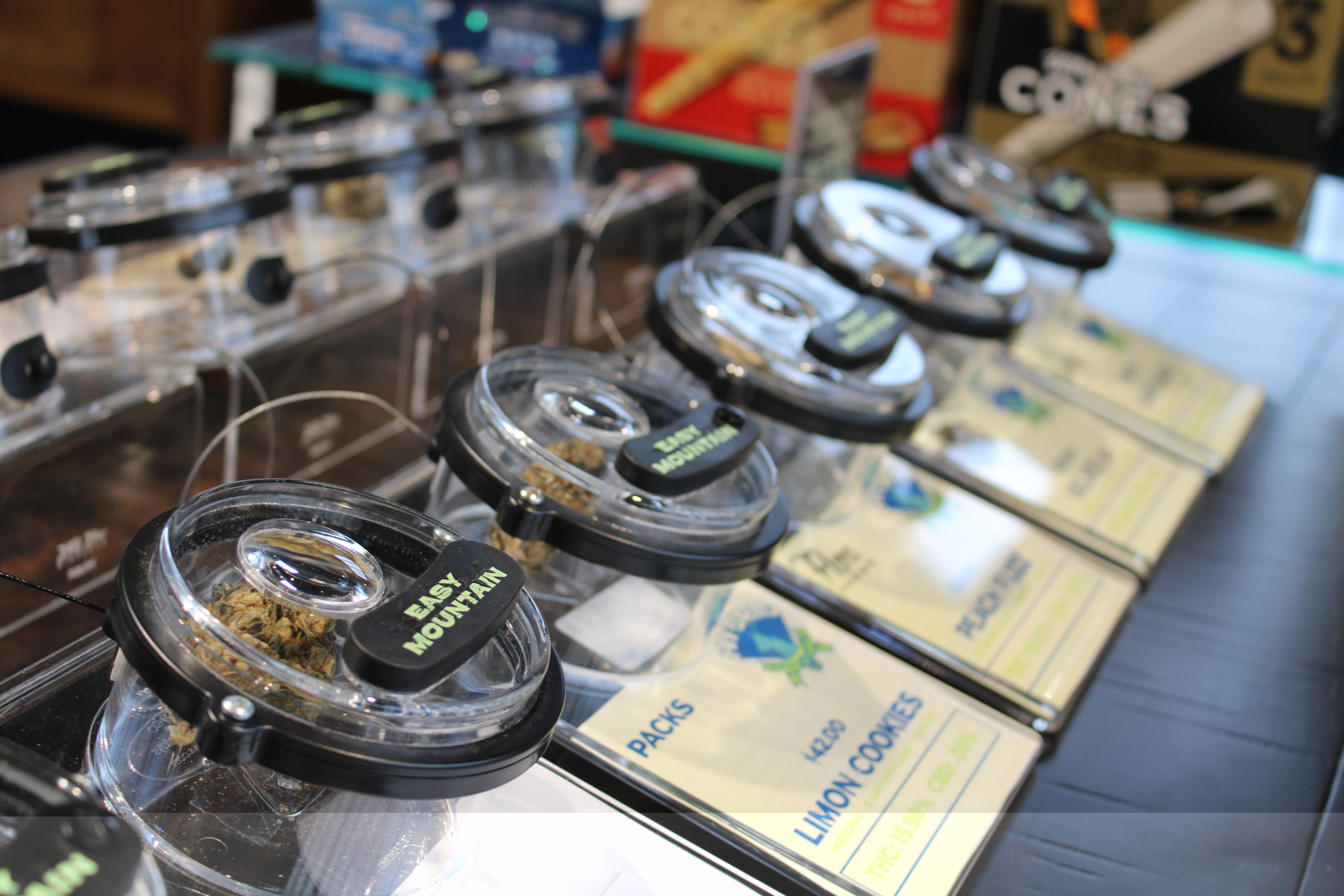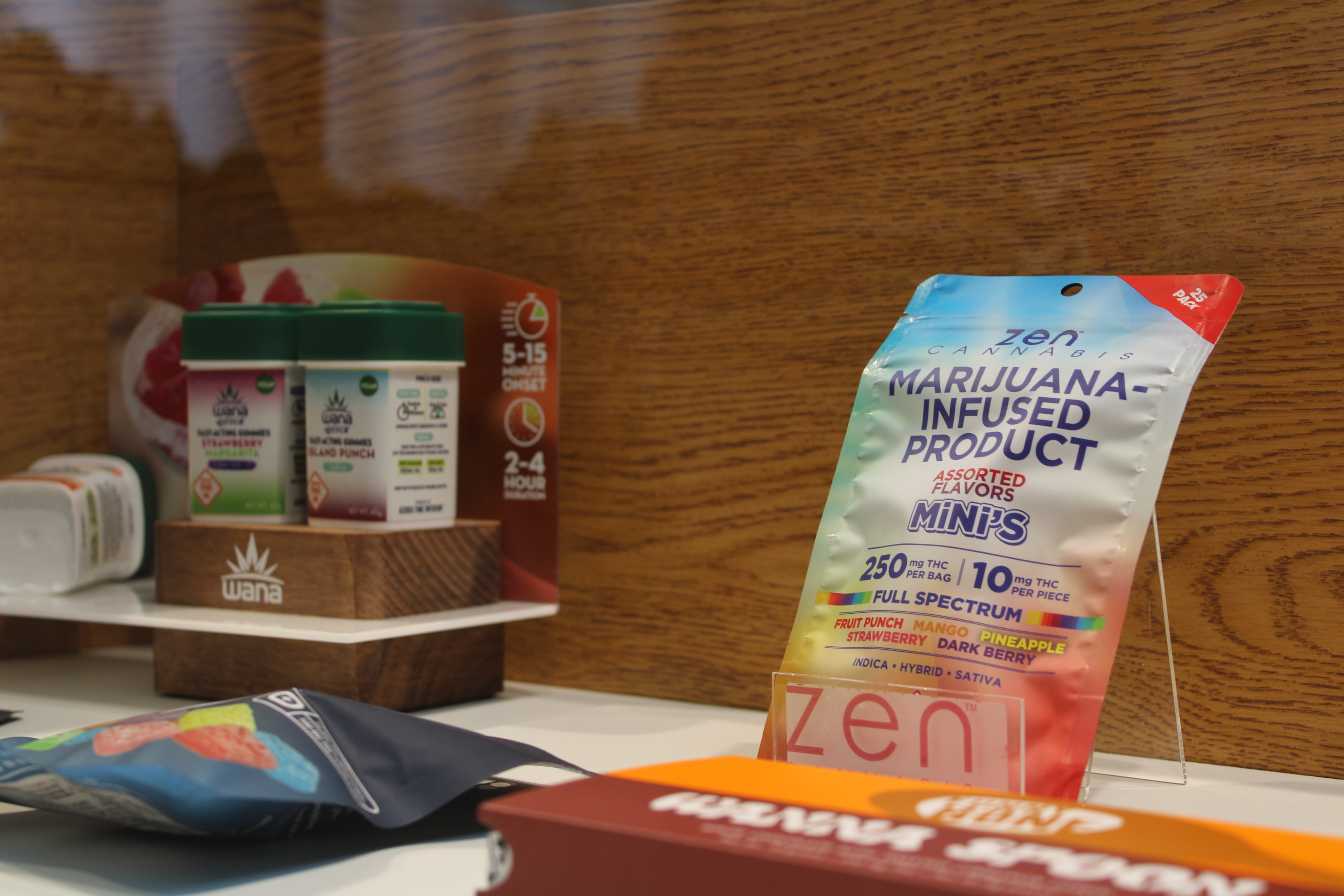IN-DEPTH |
Marijuana may be legal in Missouri now, but it will still be months before consumers can purchase cannabis, all eligible records are expunged and small businesses — dubbed in Amendment 3 as “microbusinesses” — can open their doors.
Those in Springfield — and across Missouri — who aspire to open their own marijuana facility must have patience and resilience in order to get it done.
Amendment 3, which narrowly passed in November with just over 53 percent of the vote, established a microbusiness program in Missouri, which will permit qualified entrepreneurs a chance to join the state’s rapidly growing marijuana industry.
For those bound and determined to open and own their own facility, it’ll be months before they can fill out an application, and several months more before they can open to the public. Some fear this delay in their ability to join the market at the outset of legalization will disadvantage underprivileged and minority populations, making it more difficult to get a foothold in the industry.
Why Care?
Whether you plan to (or already do) partake in Missouri’s marijuana market or not, the microbusiness provision has implications in your backyard. It is meant to diversify the booming industry and give opportunities to people in different socioeconomic and cultural backgrounds. It’s worth keeping an eye on the program’s rollout to see how effective it is at doing that.
Microbusinesses get a late break into the market, potentially more than a year out
Under medical cannabis, existing marijuana companies have been somewhat limited in their ability to expand. With a five-license limitation on dispensaries and a three-license limitation on infused-product manufacturing facilities and cultivation facilities, there’s only so much a business could grow (specifically, up to 11 total facilities).
However, with the passage of Amendment 3, incoming entrepreneurs will be even more limited compared to their peers, and existing companies will have further opportunities to expand their domain.
Microbusiness license recipients will be chosen through a lottery system of all applicants who met the sufficient criteria in the Amendment.
However, they will have longer to wait than existing facilities do to apply for comprehensive licenses. The Missouri Department of Health and Human Services (DHSS) has a 300-day window, beginning on Dec. 8, to issue the first round of microbusiness licenses.
With applications likely not available until June 2023, and licenses able to be granted as late as October, the path for microbusiness to be in full operation doesn’t appear to be plausible until 2024, according to David Brodsky, the director of retail for the Farmer’s Wife, a dispensary chain with a location in Springfield.
“I don't anticipate that any of these microbusiness licenses will make a sale in 2023 at all,” Brodsky said. “They've got to get the license, they’ve got to build the building, get the crop going.”

Local success story provides tangible hope for prospective micro license applicants
Between big players like Green Light, Proper Cannabis and Flora Farms, even with the restraints placed on their growth, it can be easy to overlook some of the smaller cannabis companies in Missouri.
Easy Mountain, a standalone dispensary in Republic located at 7827 W. Farm Rd. 174, is an example of the success a license holder with just a single facility can have in a market that's competitiveness has been questioned by opponents of Amendment 3.
“We applied for one dispensary and got one dispensary, which was really unlike most groups,” said Alex Paulson, the co-owner of Easy Mountain. “Most people applied for 20, 30 licenses and tried to get as much as they possibly could. Our goal was just to focus on what we felt like we could do really well, which is kind of just to provide a neighborhood dispensary and provide good service.”
That’s not to say that Paulson and his business partner Drew Beine don’t have aspirations of expanding in the coming years. They believe they can recreate Easy Mountain’s environment and success elsewhere in the state.
“We want to expand our brand because we feel like we're doing really good things for our patients and our consumers, and we want to continue to have more outlets to do that for more people,” Paulson said.
Up until that happens, however, they somewhat understand, as a small(er) business, the hard work that microbusinesses will have to put into becoming a solo, established brand.
Paulson attributed Easy Mountain’s success to their “authenticity,” despite competing with companies with significantly more funding behind them. He also suggested that consumers would be able to identify genuineness and support businesses, micro or not, that align with those priorities.
“I couldn't help but feel like a little fish in a big pond, obviously, with all the big corporations kind of coming in and shooting the moon as far as what they wanted to do,” he said. “But I feel good about where we're at because what we're doing is authentic. Some big brands can't replicate the authenticity of our brand and of our service and of our actual passion for the plant and the medicine.”

Opening a dispensary (or wholesale facility) just got a whole lot cheaper
Despite a slow entry to the marketplace, prospective microbusiness license holders do get some tangible benefits from Amendment 3, including lower start-up costs and more flexibility for cultivators.
The primary concept around the microbusiness provision in Amendment 3 is to permit new businesses just one license, whether it be wholesale or retail. For microbusinesses, “wholesale” is used as an umbrella term for essentially every type of facility that isn’t retail, whereas non-microbusinesses have had to apply for those licenses independently.
A wholesale facility may transport, process, cultivate or manufacture marijuana products, only to and for other microbusinesses, according to the language in Amendment 3. In turn, microbusiness dispensaries can only purchase from wholesale microbusinesses, keeping the entirety of Missouri’s microbusiness industry in its own bubble.
“One really big benefit of the micro licenses is that the wholesale licenses are essentially vertical. To that extent, they can be both cultivator and manufacturer,” said John Payne, the campaign manager of Amendment 3’s champion organization, Legal MO 22.
Microbusiness license applicants will be required to pay a $1,500 refundable application fee. If they are not issued a license through the lottery process, the $1,500 will be returned to them in full. Whereas under Amendment 2, which legalized medical cannabis in Missouri in 2018, applicants had to submit non-refundable fees that ranged from $6,000 to $10,000 for each license. After which, they would be required to pay anywhere from $10,000 to $25,000 in annual fees, depending on the type of license.

Furthermore, currently operating facilities will have to pay non-refundable fees that range from $7,000 to $12,000, depending upon the type of license, for a comprehensive-facility license, which would allow them to expand their services to the recreational market.
Under Amendment 3, microbusinesses will have to pay, in addition to their initial application, $1,500 annually, excluding their first year of licensure.
“You don't have to put together a million-dollar team and a million-dollar application to be able to win a license,” Paulson said. “But I do feel like there's a certain level of difficulty that's going to be there with them only being able to operate kind of within their own ecosystem.”
Denied applicants will be able to apply for the license continually, but because the lottery process will automatically generate qualified recipients, there is no guarantee they will ever be issued a license.
A total of three rounds of 48 licenses, six in each of Missouri’s eight Congressional districts in each round, will add up to the minimum requirement of the DHSS at 144 microbusiness licenses. However, Amendment 3 permits the DHSS to issue additional licenses.
“I think, over time, the number is going to grow in all these categories,” Payne said.
The first set of micro licenses will be issued on Oct. 4 of 2023.

Disadvantaged people, communities have a shot in the microbusiness market
Language in Amendment 3 implies the authors tried to provide equitable access to the industry, particularly favoring disadvantaged populations.
In order to have a shot in the lottery process, applicants must meet one of the following criteria:
- Have a net worth less than $250,000 and an income below 250 percent of the federal poverty level
- Have a valid service-connect disability card
- Be a person, or have a parent, guardian or spouse arrested, prosecuted or convicted of a non-violent marijuana offense in the last year, with the exceptions of providing cannabis to a minor or driving under the influence of marijuana
- Have an ZIP code or census track area where:
- 30 percent or more of the population is below the federal poverty level
- Unemployment rate 50 percent higher than state average
- Rate of incarceration for marijuana-related crimes 50 percent higher than state average
- Lives in a ZIP code with or graduated from an unaccredited school district, or an institution which had a similar designation
“I love that they've lowered that barrier to entry and I love that they're giving bonus points to people who have been arrested and disproportionately chastised for cannabis use in the past,” Paulson said.
However, many of Amendment 3’s “No” votes didn’t think it did that well enough, including the Missouri NAACP and the mayor of St. Louis, Tishaura Jones.
“This amendment, despite having positive elements, reads like it was designed to benefit current vendors and license holders — not everyday people,” Jones told the Missouri Independent in November. “I recognize the problems and stratification created by the amendment’s licensing system.”
Whether it was meant to woo some voters or address their concerns in the long-run, Amendment 3 established the position of “chief equity officer” within the DHSS.
The chief equity officer will be responsible for helping design the micro license application and overseeing the microbusiness program.
Even so, some think that there isn’t anything in the amendment to force existing license-holders to implement their own social equity policies, according to a story by the Missouri Independent.
The state, which has yet to put up a job posting on MO Careers, has until February 8 to fill the position.
Existing facilities get a head start in recreational market, opportunities to further expand
While aspiring microbusiness applicants must patiently wait for potentially up to a year to dip their toes in the recreational market, existing facilities will likely be able to start selling to the non-medical consumer as soon as early February.
Brodsky, of the Farmer’s Wife, understands why the language of the Amendment could give the appearance of giving existing facilities a head start in the recreational marijuana game. But he said it addresses the “logistical timing” of the program, and allows the regulators enough time to ensure the program gets up and running efficiently.

Existing medical facilities are already eligible to begin applying for a comprehensive facility license. Applicants will be required to submit documents that contain the following information:
- A plan to promote and encourage participation in the regulated marijuana industry by people from communities that have been disproportionately impacted by marijuana prohibition
- A plan which explains how the licensee will serve both the medical and adult-use markets, while maintaining adequate supply at a reasonable cost to qualifying patients
Beginning on Dec. 8, the state has 60 days to approve or deny the applications.
“The indications we're getting back unofficially right now is they intend to try to roll out all of the approvals at the same time, to be fair to everybody on getting out of the gate at the same time,” said Mark Hendren, the CEO of Flora Farms, in an interview with the Daily Citizen.
Only licensees that are in ‘good standing’ will be eligible for the comprehensive facility license. Good standing is determined by whether the license is active and not suspended when the request is made, according to a draft rule by the DHHS. It is one of many draft rules proposed by the Department; public comment concluded on Nov. 25, and the state is in the process of officializing the regulations.
Despite the timetable of microbusinesses, Brodsky doesn’t think it will have a negative effect on their ability to break into the market.
“It seems as though there will be opportunities out there and in markets where they're not being served quite as well as a new micro license might be able to do,” said Lyndall Fraker, the former director for Missouri’s Section for Medical Marijuana. “Filling in a gap, specializing. I guess it would be equated to a big box retailer and a boutique-type facility.”
Fraker has since stepped down from his leadership role and into the position of director of public outreach as the Section for Medical Marijuana is being phased into the Division of Cannabis Regulation.
“The top three things that your cannabis consumer looks at are price, product [quality], and how close the store is to them,” he said. “If they pick a good location and they have good products and good prices, there's plenty of room.”
Paulson, with the perspective from a one-facility-show, concurred with Brodsky.
“It'll be a nice breath of fresh air for the consumer to have some new brands come into the market,” Paulson said. “I'm confident that there will still be plenty of a market for them.”
That breath of fresh air may be polluted with familiarity, however. Amendment 3 loosened the limitation on existing facilities, by allowing them to own up to 10 percent of any given type of license within 548 days of Amendment 3’s implementation on Dec. 8.
“We want to give them an opportunity to get up and running before they issue more comprehensive licenses,” Payne said. “…There is, in any market, a tendency towards some consolidation for efficiency, and so I think we're gonna see some of that, but it's still going to be a very competitive market.”
Paulson, doesn’t want, nor expects, any sort of monopoly to form based on the new threshold of 10 percent for existing companies.
“I don't want to see the market get monopolized, I think competition within cannabis is good,” Paulson said. “But 10 percent of the licenses would make it go from three to six. So it's not like they'd go from three to 40 or something like that, where they're owning all of them.”

Microbusiness provision a “double-edged sword”
“It’s a double-edged sword,” Paulson said. “There's massive benefits to how they've set up the micro licenses, there's clear drawbacks with the restrictions and how much they can produce. But the long and short of it, in my opinion, is that for some of those populations to be able to get into it without a huge investment is incredible.”
Despite microbusinesses' inability to control nearly as much of the market as their larger, more established peers, Paulson thinks the way the microbusiness provision in Amendment 3 was written opens the door for opportunities that weren’t otherwise available to some people.
“Just the ability to be able to put your name in the hat, get your funds back if you don't get it,” he said. “Right there alone, I think makes it just an insanely more fair process for people to hopefully get involved, and I'm looking forward to seeing what some of these individuals do with some of these creative licenses.”
Learn more about microbusinesses
If you or someone you know is interested in applying for a microbusiness license, or you simply want to know more about the program, read up on Amendment 3 and keep an eye out for the application and new information on the DHSS website.

